"2013 Korea-China Peaceful Unification Forum" held in Beijing, China on the 60th anniversary of the armistice of the Korean War
Constructive roles of China in peace and unification of the Korean Peninsula based on trust between Korea and China
The 2013 Korea-China Peaceful Unification Forum was held on July 24 at Koonrun Hotel in Beijing, China to discuss the methods of putting an end to the armistice of the Korean Peninsula and achieve peace and unification of the peninsula on the occasion of the 60th anniversary of the armistice agreement of the Korean War.
A total of 20 experts from Korea and China attended the forum -- titled "60th Anniversary of Armistice of the Korean War -- Ask Peace" -- to discuss the following subjects: "Armistice of the Korean War and its Meaning in 2013," "Role of China to End the Armistice System and Relations between China and North Korea," and "Situation of Southeast Asia and Future of the Relations between Korea and China."
The forum was supported by the Chosun Ilbo Daily and organized by the Beijing Committee of the Council; a total of 250 persons including members, compatriots living in Beijing, experts, and college students attended the event, which lasted for 8 hours. Attendants joined the debate and raised various sharp and detailed questions.
Opening
- Hyun Kyung-dae, Executive Vice-chairperson of the Council, Park Byeong-seok, Vice Speaker of the Korea National assembly of Korea, Ahn Hong-jun, Chairperson of the Diplomacy and Unification Committee of the National Assembly, Kwon Yeong-se, Korean ambassador to China, and Lee Hun-bok, Vice-chairperson of the China Municipal Chapter, attended the forum.
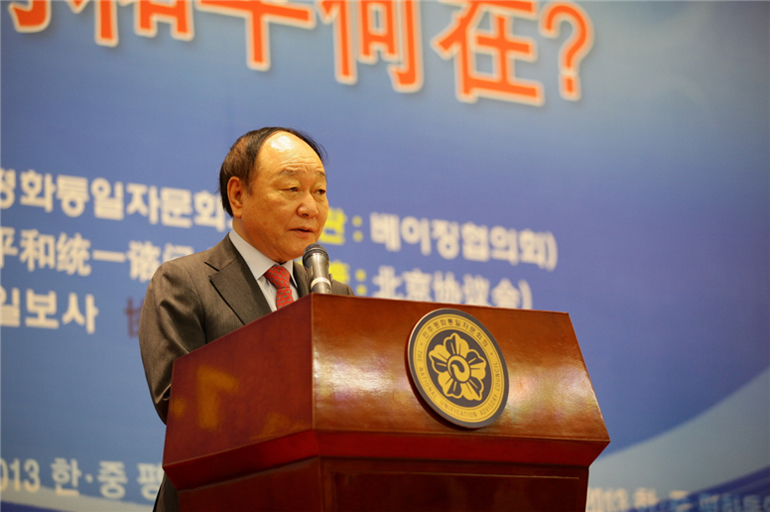
Opening speech by Hyun Kyung-dae, Executive Vice-chairperson of the Council
"The North Korean regime, which was threatening war, proposed a series of dialogue to South Korea recently. It is the result of the principle and consistency of the Park Geun-hye Administration's policy toward the North, which is ‘Punishment against provocation’ and ‘Dialogue for dialogue’,” said Hyun, Executive Vice-chairperson of the Council, in his opening speech. Evaluating the current situation, he said that, so far, no agreement has been made between South and North, but a series of dialogues are underway. "We can regard the Korean Peninsula Trust-Building Process as proposed by President Park as the basic stage," he added.
He reminded the attendants of President Park's suggestion to return the 360 corpses of the Chinese soldiers killed during the Korean War when she paid a state visit to China. He took such suggestion to mean that the two countries, which had fought against each other six decades ago, can now make old wounds a driving force for future development. "We wish North Korea will break away from the old frame of cold war and join the grand march for the bright future of the Korean Peninsula," he said.
According to Hyun, putting an end to the unstable armistice system of the Korean Peninsula and building a peace system are not only an issue of the two Koreas but are also directly related to world peace. “The cooperation of adjacent countries is absolutely required for peace and unification of the Korean Peninsula to take root; hence the need for close cooperation between Korea and China," he stressed. He asked China for its positive cooperation in making North Korea a member of international society.
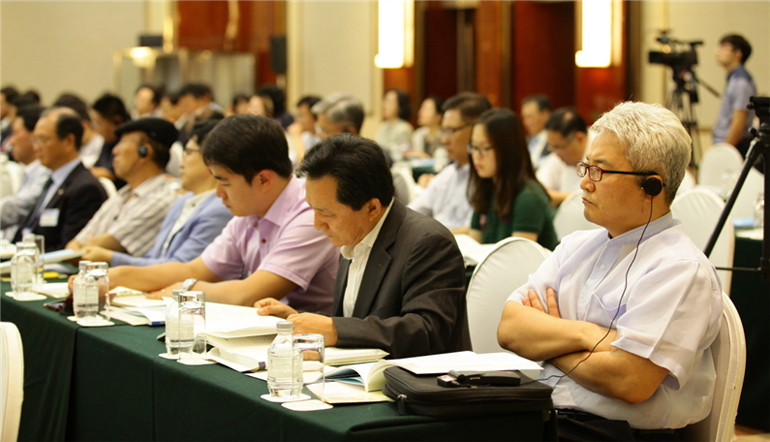
250 persons joined the forum, which lasted for 8 hours
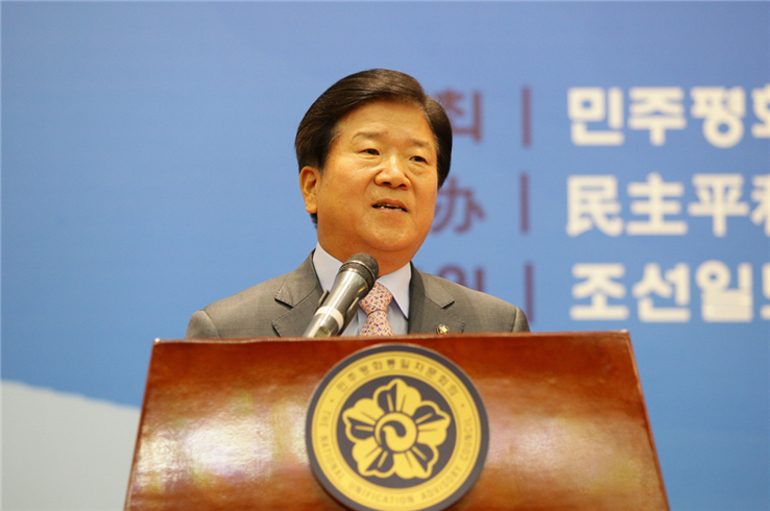
Park Byeong-seok, Vice Speaker of the Korea National Assembly
"It is very meaningful for the experts of Korea and China to discuss the peace, development, and future of the two countries on the occasion of the 60th anniversary of armistice of the Korean War. Realizing lasting peace on the Korean Peninsula should lead to the unification of two Koreas. Note that peace and unification of Korea correspond to the dream of China," said Park Byeong-seok, Vice-chairperson of the Korea National Assembly.
"President Park visited China last June with the slogan of ‘Travel to expand the mind’; this forum is also one of such travels," said Ahn Hong-jun, Chairperson of the Diplomacy and Unification Committee of the Korea National Assembly.
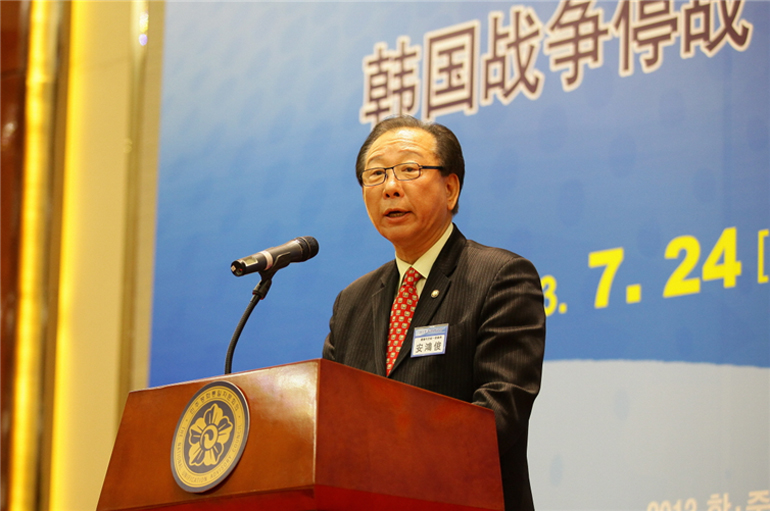
Ahn Hong-jun, Chairperson of the Diplomacy and Unification Committee of the Korea National Assembly
Ahn added that the importance of political exchange between Korea and China cannot be overly emphasized amid the changing situation of Northeast Asia. In addition to the current communication channels between Beijing and Seoul such as regular visits of foreign ministers, hot lines, and strategic dialogues between the deputy foreign ministers, Ahn stressed the need to expand the exchanges between the National People's Congress of China and National Assembly of Korea.
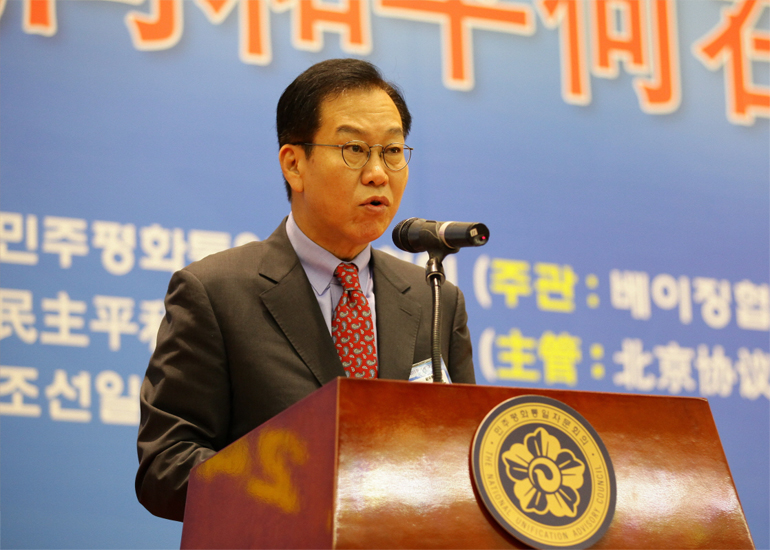
Ambassador Kwon Yeong-se to China
"Developed relations between Korea and China based on mutual respect will be the ultimate foundation of processing the unification of the Korean Peninsula. Realizing the denuclearization of North Korea and pursuing common prosperity by leading North Korea to reform and open the country will correspond to the interest of the two countries. Therefore, close cooperation between Seoul and Beijing is essential to realize such common purpose," said Ambassador Kwon Yeong-se in his welcoming message.
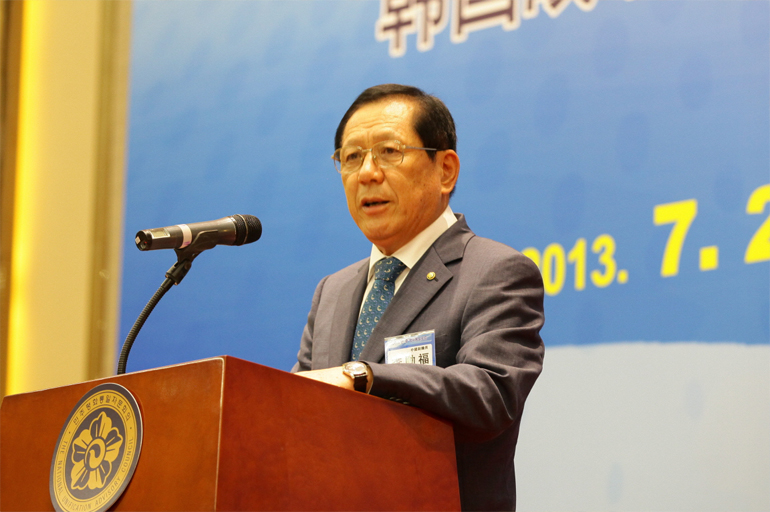
Welcoming Address by Lee Hun-bok, Vice-chairperson of the China Municipal Chapter
"Holding the forum in Beijing with Chinese experts is very meaningful at this time when two summits of the USA and China shared the recognition of ‘Non-permission of Nuclear Weapons by North Korea,’ the ‘Agreement on the Denuclearization of the Korean Peninsula’ between the summits of Korea and China was concluded, and the existing relations between China and North Korea are expected to change," said Lee Hun-bok, Vice-chairperson of the China Municipal Chapter.
First Session: Armistice of the Korean War and Its Meaning in 2013
Chair-Prof. Jeong Jong-wook of Donga Univ. presided over the forum themed "Armistice of the Korean War and Its Meaning in 2013." Prof. Neujin of Beijing Univ., Prof. Lee Geun-kwan of the Graduate Law School of Seoul National Univ., Park Yeong-ho, senior researcher of the Korea Institute for National Unification, and Waishung, manager of the Military Science Institute of China, participated in the discussion.
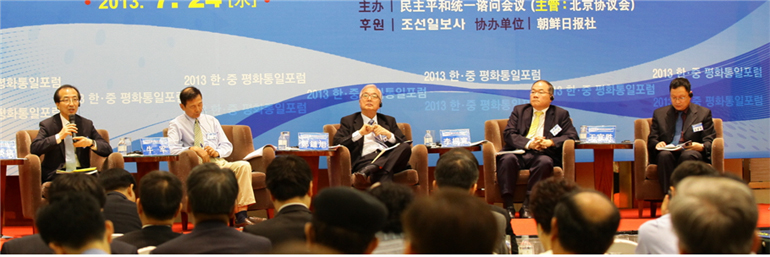
from left to right: Park Yeong-ho, senior researcher of the Korea Institute for National Unification, Prof. Neujin of Beijing University, Chair Prof. Jeong Jong-wook of Dongah University, Prof. Lee Geun-kwan of Seoul National University, and Waishung, manager of the Military Science Institute of China
"When the armistice agreement was executed, the relationship with the alliance was the basic element in deciding the national policy of China, dispatching armed forces, or making the final decision on whether to declare a ceasefire or not," Prof. Neujin said. He analyzed how the relationship between USSR and North Korea was treated and how the relations with an ally affected the recognition and choice of China.
"The Chinese government's entry in the Korean War was dependent on the US forces' crossing the 38th parallel, which had symbolic significance to the Chinese leaders at the time. A government friendly with Beijing existing along the border of China was, is, and will be the basic recognition of China. The Chinese government believes that US forces should not be stationed in the area of North Korea after the two Koreas are unified," he added.
According to Prof. Neujin, the relationship between Beijing and Washington is changing, and no alliance between China and Russia exists, but the cold war continues in Korean Peninsula, which is causing various problems in the region. “It is very meaningful for the scholars of China and South Korea to discuss peace on the Korean Peninsula in China," he said.
Prof. Lee Geun-kwan reviewed the armistice of the Korean War and international law implication of establishing the peace system of the Korean Peninsula in terms of its special features.
"Considering the Korean Peninsula to be in a war situation after the ceasefire is a problem, and it is not reasonable to substitute the armistice agreement with a peace treaty. Peace treaty means the Peninsula returns to its status before the Korean War, and executing a normal peace treaty causes some problems since the relationship between South and North Korea is very unique," Prof. Lee said.
According to him, ceasefire on the Korean Peninsula does not carry any positive meaning of recovering the peaceful status, but armistice in the country should be regarded as abandoning engagement permanently in the future. “If any party to the armistice agreement would exercise military force, such will be regarded as a new act of aggression," he said. He went on to explain that the current ceasefire status means that the war is over, but that it is a “Third Legal Status” wherein peace is not set up.
Prof. Lee said that we should review the right way of establishing real peace on the Korean Peninsula. The establishment of peace system in the country can be possible only through the peaceful unification of the two Koreas, he adds.
Prof. Lee suggested that China expand its sights to the universal level in relation to the issue of the Korean Peninsula to help achieve regional stability through real peace on the Peninsula.
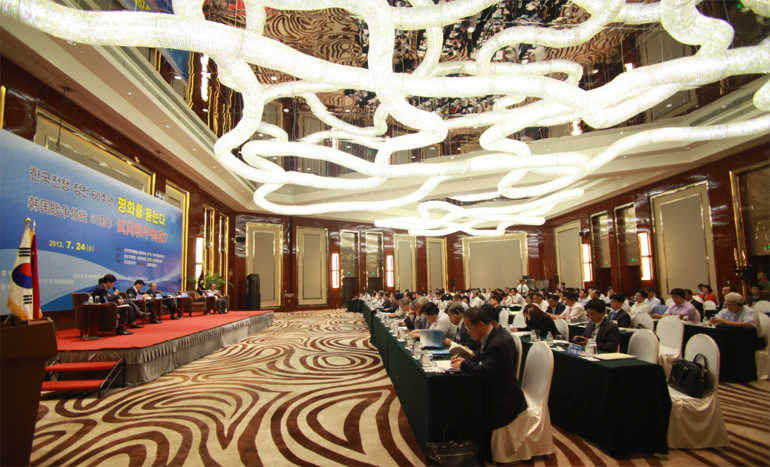
Beijing Forum
Park Yeong-ho, senior researcher, pointed out that North Korea is the only country that has not been changed among those that engaged in the Korean War. China should play the role that was evident while the armistice agreement was executed in today’s changed situation.
"Peace and stability of the Korean Peninsula are very important to China, and Beijing is thinking about the peaceful stability of Korean Peninsula, denuclearization, resolution of problems through dialogue, and peaceful unification through dialogue," said Manager Wangi Shung.
Second Session: Relations between China and North Korea and role of China in ending the armistice system
Honorary Prof. Park Doo-bok of Korea National Diplomatic Academy presided over the afternoon session themed "Relations between China and North Korea and Role of China in Ending the Armistice System." Assistant Prof. Chungxiahu of the International Relation Institute of People's Univ., Park Byeong-kwang, researcher of the National Security Strategy Institute, Prof. Jiangren Kui of Central Party Univ., Lee Tae-hwan, director of the China Research Center of Sejong Institute, and Prof. Lee Hee-ok of Sungkyunkwan Univ. participated in the discussion.
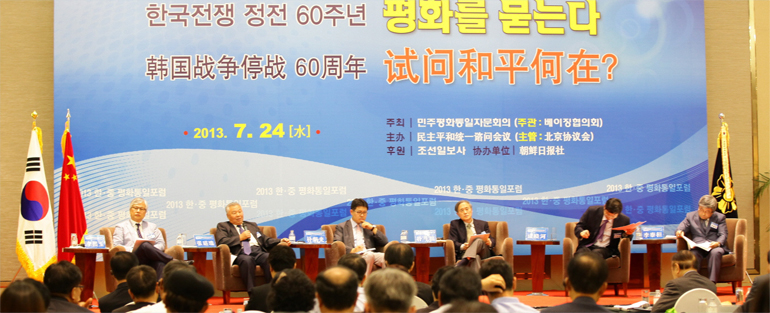
from left to right: Prof. Lee Hee-ok of Sungkyunkwan Univ., Prof. Jiangren Kui of Central Party School, Park Byeong-kwang, researcher of the National Security Strategy Institute, Honorary Prof. Park Doo-bok, Korea National Diplomatic Academy, Prof. Chungxiahu of People's Univ., and Lee Tae-hwan, manager of the China Research Center of Sejong Institute
During his presentation on the "Relations between China and North Korea under the New Leadership," Prof. Chungxiahu suggested 3 issues that have changed and 3 issues that have not changed in relation to the attitude and policy of China toward North Korea for the past 6 ~ 8 months after the third nuclear test of North Korea.
Those that have changed are: △ Pressure of Chinese leaders for denuclearization; △ Public opinion of China criticizing North Korea, and; △ Chinese policy shifted to solving the North Korean issue through international cooperation. On the other hand, those that have not changed are: △ Strategic value of North Korea; △ No discarding North Korea, and; △ Denuclearization policy of the Korean Peninsula.
"Building a peace system was a years’ long issue, but it was easier to solve than unification itself. Because unification and peace system were linked, however, building a peace system became more difficult and complicated. Korea and US included the issue of executing a peace treaty in the cards to solve the nuclear issue of North Korea; accordingly, the issue of peace system of the Korean Peninsula changed as if it is a hostage of the North Korean nuclear issue," Prof. Chungxiahu asserted.
According to Park Byeong-kwang, researcher of the Korean institute, the change of North Korea including denuclearization should be a prerequisite to ending the ceasefire system and building a peace system; the next issue is cooperation of the surrounding countries including close cooperation between South Korea and China. The two countries need to discuss in depth how to make North Korea join the international society through the reformation and opening of North Korea, he adds.
"China can say No! to the USA but not to Pyeongyang, and Beijing has been dragged down by Pyeongyang. The image of China has been damaged because China cannot turn its back on North Korea even though Beijing is changing its tune against North Korea," Park said.
Park suggested the following for closer cooperation between Beijing and Seoul: △ Establish strategic communication and trust structure; △ China should not be regarded as a dependent variable of Korea-US relations but as an independent variable; △ Cooperation in areas of military and security between Korea and China should be strengthened and systemized; △ Korea-China relations should be systemized in a frame of multilateral security cooperation.
Prof. Jianrenkui pointed out that such opinion of substituting the armistice system with the peace system sounds nice, but that it is very difficult to build a peace system with North Korea, which has changed to be a country possessing nuclear weapons. Executing a peace treaty between the USA and North Korea will be unrealistic because it would be accepting North Korea as a country possessing such weapons from the American point of view, he says.
"Beijing's principles in executing a peace treaty of the Korean Peninsula are as follows: △ The peace treaty should be signed by all the countries concerned with Korean Peninsula, and; △ The peace treaty should proceed simultaneously with the abolishment of nuclear weapons of North Korea,” he added.
According to Lee Tae-hwan, director of the Korea center, Chinese policy toward North Korea seems to have changed because Beijing judges that the nuclear issue of North Korea may endanger China as well. “China should promote its policy more positively based on peace making rather than peace keeping of the Korean Peninsula," he said.
Prof. Lee Hee-ok of Sungkyunkwan Univ. cited the reasons for Beijing's participation in the sanctions against North Korea: △US policy of re-balancing becomes serious; △ Make US stand neutral in the China-Japan conflict; △ Chinese leaders are tired of nuclear tests by North Korea; △ Need to control the uncertainty of Kim Jeong-eun's regime, and; △ Enhanced possibility of disputes over the Korean Peninsula.
Diagnosing the current situation, Prof. Lee believes China recognizes that North Korea would return to the dialogue table since Pyeongyang has used up all its cards after its nuclear test. According to her, the Chinese policy for North Korea is now evolving, and Beijing manages the Korean Peninsula as a whole.
Third session: New Trends in the Situation on the Korean Peninsula and Chinese Maneuver
The third session of the forum was presided over by Prof. Choo Sulong of Tsinghua University of China. Attendants in the session were Jin Chan-ryong, deputy director of the International Relation Institute of People's Univ., Prof. Kim Heung-kyu of Sungshin Women's Univ., Prof. Jeon Seong-heung of Sogang Univ., Suyungming, researcher of the International Issue Research Institute, and Prof. Lee Nam-joo of Sungkonghoe Univ.
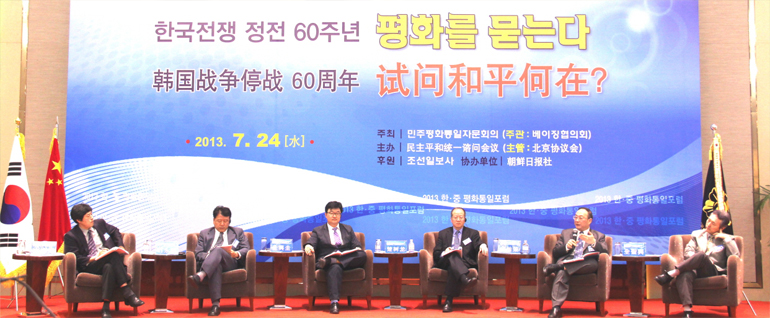
Third session (from left to right): Prof. Lee Nam-joo of Sungkonghoe Univ., Suyungming, researcher of the International Issue Research Institute, Kim Heung-kyu of Sungshin Women's Univ., Prof. Choo Sulong of Tsinghua Univ., Jin Chan-ryong, deputy director of the International Relation Institute of People's Univ., and Prof. Jeon Seong-heung of Seogang Univ.
"Chinese policy and attitude toward North Korea changed to some extent, but nobody can expect fundamental changes in that regard because they are not strategic changes but tactical ones only. Therefore, for the sake of the future of China and Korea, Korea should △ not expect too much, △ provide creative space between the two superpowers, China and America, and △ consider economic cooperation in Northeast Asia,” stressed Jin Chan-ryong, deputy director of the International Relation Institute of People's Univ.
Mr. Jin added that Korea will agonize further and should particularly strive to find its own role in establishing and maintaining desirable relations between Beijing and Washington.
"The peaceful unification of the Korean Peninsula as proposed by South Korea has secured the position of 'Four Principles for the Korean Peninsula' of China in addition to the existing 'Three Principles' following President Park's visit to China last June. It implies that China does not object to autonomous peaceful unification by South Korea, and Beijing sent a very powerful message by warning Pyeongyang," Prof. Kim Heung-kyu of Sungshin Women's Univ. said.
Prof. Kim suggested the problems to be overcome by Seoul and Beijing and asserted that the two governments are confined in a structure wherein they cannot have strategic trust. To solve such problems, △ South Korea and China should have strategic dialogues in all areas, △ Risk management mechanism should be provided as soon as possible between the two countries, and △ Joint measures between Seoul and Beijing are required for the reformation and opening of North Korea.
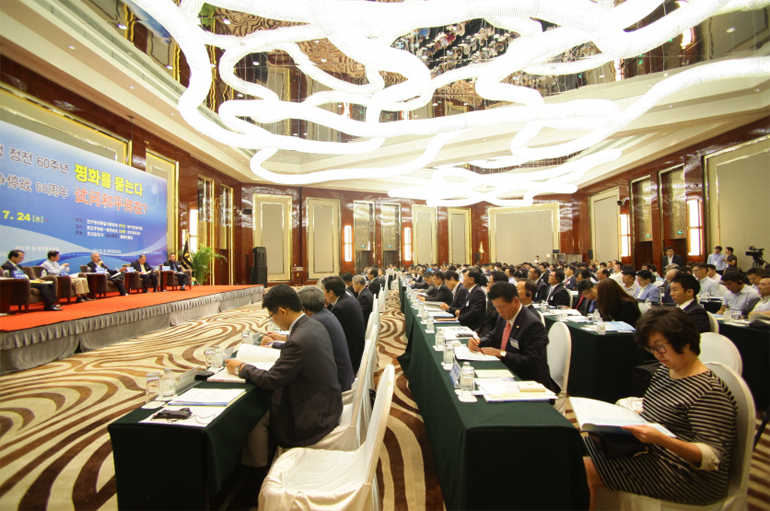 "If the relations between China and North Korea deteriorate, solving the issues of North Korea becomes very difficult, and such will eventually increase the cost of compensating North Korea for abandoning its nuclear arms. Therefore, we should find another way if the current methods do not work properly," Prof. Jeon of Seogang Univ. said.
"If the relations between China and North Korea deteriorate, solving the issues of North Korea becomes very difficult, and such will eventually increase the cost of compensating North Korea for abandoning its nuclear arms. Therefore, we should find another way if the current methods do not work properly," Prof. Jeon of Seogang Univ. said.
He added that the ambiguity of Beijing's policy toward North Korea may be effective from the short-term perspective, but that it can cause problems in the long run in this region, and that such ambiguity may lead to North Korea not realizing the seriousness of the nuclear issue.
"The Korean War was a problem of national unification for South and North Korea, a collision between capitalism and socialism for the USA, and a war against America for China; thus indicating the complexity of Northeast Asia. We should prepare for the future in a historical context instead of depending on the responsibility," stressed Suyungming, a researcher of the International Issue Research Institute, in the forum.
Analyzing the current situation, he thinks there was no fundamental or strategic change of Chinese policy toward North Korea. “The attitude of Beijing may have changed, but China has been objecting to the nuclear test of North Korea in a definite voice, and China is implementing its policy since Beijing warned Pyeongyang after the test. Thus, nothing much has changed on the Chinese side," he said.
According to Prof. Lee Nam-joo of Sungkonhoe Univ., Korea-China relations do not seem to have strategic conflict in a bilateral aspect, but strategic distrust exists between them because of the relations between South Korea and America and that between North Korea and China. Honest dialogue between Seoul and Beijing is required to get rid of distrust, and not only the voice between the nations but also the opinions of individual persons should be raised actively, he adds.
"It takes time to judge whether the change of Chinese policy toward North Korea is strategic or tactical. With Beijing acknowledging the changes of USSR and eastern bloc, China should acknowledge the "regime change" of North Korea and try to support the unification of the Korean Peninsula," Prof. Choo Sulong of Tsinghua Univ. emphasized.
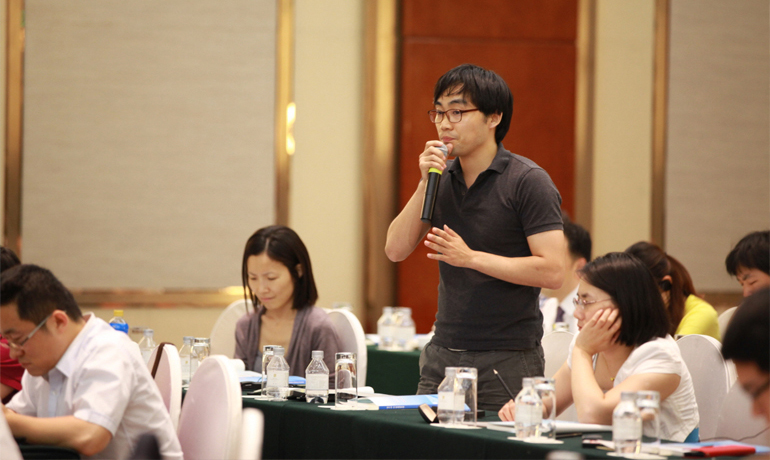 Prof. Kim Heung-kyu presided over the last session of the forum, wherein the following participants presented their views: Chair-Prof. Jeong Jong-wook of Dongah Univ., Honorary Prof. Park Doo-bok of the Korea National Diplomatic Institute, Park Yeong-ho, senior researcher, Prof. Lee Nam-joo of Sungkonghoe Univ., and Prof. Cheongxiohuh of People's Univ.
Attendants in the forum said that the discussion on the "60th anniversary of Korean War" and "future of Korea and China" in Beijing is really a great change, and that they were able to reaffirm hope that the two countries could open a new era.
Prof. Kim Heung-kyu presided over the last session of the forum, wherein the following participants presented their views: Chair-Prof. Jeong Jong-wook of Dongah Univ., Honorary Prof. Park Doo-bok of the Korea National Diplomatic Institute, Park Yeong-ho, senior researcher, Prof. Lee Nam-joo of Sungkonghoe Univ., and Prof. Cheongxiohuh of People's Univ.
Attendants in the forum said that the discussion on the "60th anniversary of Korean War" and "future of Korea and China" in Beijing is really a great change, and that they were able to reaffirm hope that the two countries could open a new era.


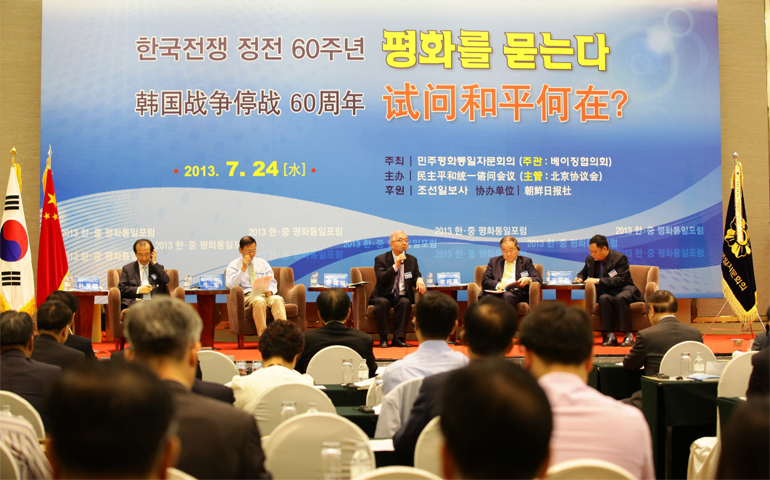









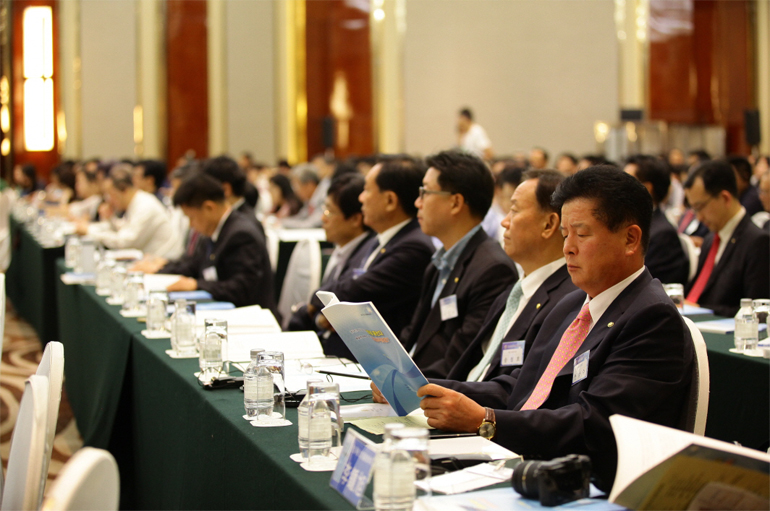

 "If the relations between China and North Korea deteriorate, solving the issues of North Korea becomes very difficult, and such will eventually increase the cost of compensating North Korea for abandoning its nuclear arms. Therefore, we should find another way if the current methods do not work properly," Prof. Jeon of Seogang Univ. said.
"If the relations between China and North Korea deteriorate, solving the issues of North Korea becomes very difficult, and such will eventually increase the cost of compensating North Korea for abandoning its nuclear arms. Therefore, we should find another way if the current methods do not work properly," Prof. Jeon of Seogang Univ. said.
 Prof. Kim Heung-kyu presided over the last session of the forum, wherein the following participants presented their views: Chair-Prof. Jeong Jong-wook of Dongah Univ., Honorary Prof. Park Doo-bok of the Korea National Diplomatic Institute, Park Yeong-ho, senior researcher, Prof. Lee Nam-joo of Sungkonghoe Univ., and Prof. Cheongxiohuh of People's Univ.
Attendants in the forum said that the discussion on the "60th anniversary of Korean War" and "future of Korea and China" in Beijing is really a great change, and that they were able to reaffirm hope that the two countries could open a new era.
Prof. Kim Heung-kyu presided over the last session of the forum, wherein the following participants presented their views: Chair-Prof. Jeong Jong-wook of Dongah Univ., Honorary Prof. Park Doo-bok of the Korea National Diplomatic Institute, Park Yeong-ho, senior researcher, Prof. Lee Nam-joo of Sungkonghoe Univ., and Prof. Cheongxiohuh of People's Univ.
Attendants in the forum said that the discussion on the "60th anniversary of Korean War" and "future of Korea and China" in Beijing is really a great change, and that they were able to reaffirm hope that the two countries could open a new era.